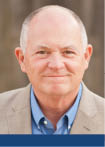When to Be Closing
By Scott Ellis, Ed.D.
September 13, 2023

What is your most frequently quoted movie? Is it Caddyshack? Perhaps it’s The Big Lebowski. By far, the most quoted mantra for sales professionals must be from Glengarry Glen Ross: “Always Be Closing.” What sets the best packaging salespeople apart is not the “ABC” principle but knowing when to be closing. By the way, this is said with a Talladega Nights level of “all due respect.”
My introduction to the packaging industry was an investigation into what abilities and traits are unique to those who consistently sell at a high level. My toolbox included measurement and interview tools to isolate the abilities and traits that equipped eight diverse individuals to average a million dollars a month in sales. This was back in the day when a million dollars was a lot of money.
The project assessed math and language problem-solving skills and found that top performers had the expected verbal reasoning but also possessed even stronger math skills. Spatial reasoning was measured in the hopes that specifications communicated in two dimensions resulted in working three-dimensional products. Lastly considered were a range of general personality traits and those specifically related to sales.
Consistently productive salespeople shared a constellation of traits, though their methodology varied. Measures of sales performance normally render scores for sales disposition, comfort with cold calling, and sales closing. While all top performers were above average in all three of these measures, the highest scores were for closing. Looking deeper, it was not surprising to find that diplomacy, self-confidence, and the ability to stay motivated with minimal supervision were common to the group. One factor that stood out was a level of uncooperativeness that operated without the loss of diplomacy. In short, these people know when to close. They know when not to take no for an answer. They push when others would retreat to attack another day.
Those who are always closing are perceived as self-serving and overly aggressive. Knowing when to stay, to push, or to offer a solution is the distinctive mark of great salespeople. This takes people skills or what Daniel Goleman termed “emotional intelligence” (also known as “emotional quotient” or EQ). This is a measurable quantity of people skills he defined in his first book on the topic as “in practical terms … being aware that emotions can drive our behavior and impact people (positively and negatively) and learning how to manage those emotions—both our own and [those of] others.”
Research and practical experience have shown that EQ can be improved. This is good news because no shortage of technically skilled but interpersonally challenged workers has been reported. How does one approach such an individual? Well, one guarantee is you will not be the first to broach the subject. Past employers, coaches, and spouses will have discussed this relationship-limiting situation. In fact, all of us can improve our EQ, and it may be a good exercise for the entire sales team.
An EQ resource was recently added to the Packaging University, the online learning platform of AICC. I contacted Daniel A. Feldman, Ph.D., author of The Handbook of Emotionally Intelligent Leadership, which includes an assessment of EQ. Having received permission to utilize the assessment online, a student is now able to take the assessment and gain clear feedback for improvement in areas of strength and weakness. The class includes several exercises to develop key skills and gain feedback on progress. The course is titled Emotional Intelligence for Career Development.
It applies to all of our jobs and could be a part of any department’s continuous improvement efforts. In this model, team members take the course individually and then discuss its practical application as a group.
In summary, the research into what sets top salespeople apart included excellence in various abilities and traits. I believe that chief among them is development of the ability to recognize and adapt to one’s own emotions and those of others. Conscious effort to improve my own EQ has enriched my business and personal relationships. As Carl Spackler in Caddyshack once said, “I’ve got that going for me, which is nice.”

Scott Ellis, Ed.D., delivers training, coaching, and resources that develop the ability to eliminate obstacles and sustain more effective and profitable results. He recently published Dammit: Learning Judgment Through Experience. His books and process improvement resources are available at workingwell.bz. AICC members enjoy a 20% discount with code AICC21.

